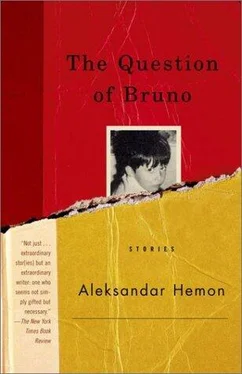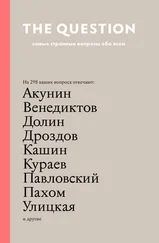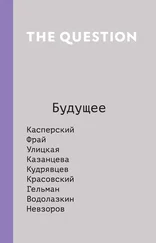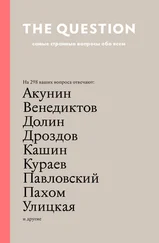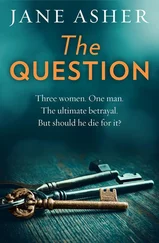We cannot be entirely sure what it was that he expected to happen.
He washed his pale-blue underwear and the exhausted collar of his rather unseemly flannel shirt, and then stretched them across the chair. He thrust himself upon the bed, which routinely creaked, and lay naked, trying unsuccessfully to calculate the time difference between Washington and Sarajevo (six hours), until he fell asleep.
He woke up and didn’t know where he was or who he was, but then he saw his underwear spreading its pale-blue wings across the chair, providing clear evidence of his existence prior to that moment. He got up, liberated the window from the curtain’s oppression, and saw that it was daytime, because some confused light clambered down the wall, and waited outside the window to be let in and scurry to the dark corners. He was delighted with the whole poetic-morning setup, until he found out that his underwear was still moist.
He did not hear the maid because he was drying his pants with a hair dryer, which he discovered in the holster, like a concealed revolver, by the mirror. She boldly walked in and saw him clutching his underwear with his left hand and pressing the hair dryer’s muzzle into its face, as if torturing it to confess. We should point out that he was butt-naked and was brandishing a regular morning erection. Pronek and the maid — a slim young woman with a paper tiara on her head — were locked together in a moment of helpless embarrassment, and then Pronek slowly closed the door. He sat on the toilet seat, thinking about the loss of his suitcases, which must have been freezing somewhere up in the heavens, stacked up, with all the other completely foreign and unfamiliar suitcases, in a cavernous underbelly of a plane, heading away, away from him. When he finally put on his broken-down shorts and mustered up enough audacity to face the maid, she was gone. His bed was all straightened up, and there was a piece of red heart-shaped candy on the pillow. Pronek imagined having a passionate affair with the maid, who really was a daughter of a New York billionaire, trying to lead an independent, dignified life and get on with her painting career. He could see himself moving back to New York with her; he would live in a shabby, but homey, apartment in Greenwich Village and support her, making love to her in saxophone slow motion, kissing her graceful hands and dainty cheeks stained with vivid colors.
Simon waited for him at the reception desk, except that he was not Simon, but someone else who looked like Simon, save for the thick glasses and a torus of fat resting on his hips and pelvis. He serenely informed Pronek that he hoped Pronek had slept well, and that Pronek’s luggage had been found in Pensacola, Florida. They drove past the same monuments and buildings, in front of which there were insectile machines, plowing away lumps of snow. They (Pronek and Simon no. 2) stopped in front of a large mansion hiding behind a marble-white set of pillars, akin to Gargantuan prison bars. On the lawn, covered with whipped-creamy snow, there was a sign with an eagle spreading its awesome wings, frowning away from the house, as if pissed off at the inhabitants. They walked into a large hall and there was a uniformed guard under a colorful picture of the uncomfortably smirking George Bush.
“Hi, George!” said Pronek’s escort.
“Hi, Doc!” said the guard, who stood with his legs spread, and his hands wedged authoritatively in his armpits. Doc disappeared into the office maze behind George’s back. George ordered Pronek to wait in the hall, whose walls were covered with paintings of stuck-up men, their cheeks slightly turgid, as if their oral caverns were full of smoke they didn’t dare exhale. The same pissed eagle, Pronek noticed, was stretched flatly across the floor, and the ceiling was so high that “the eye struggled in vain to reach the remoter angles,” to quote one of our great writers. The sign propped on a scrawny wooden stand said: “No Concealed Weapons.” It was cold, so Pronek sat in an armchair, with his hands deep in his pockets, under the gaze of a man with puckered lips and eyebrows in the shape of a distant seagull. Pronek played with marbles, which still lay in transoceanic hiatus at the bottom of his coat pockets, revolving them around each other. Then — to our surprise — a man sped out from behind George’s back with his right hand extended in front of him, and a genuinely counterfeit smile. As Pronek was pulling his hand out, he said: “Welcome!” and the marbles, finally freed from lint chains, leapt out of the pocket and began bouncing away from each other, cackling in their sudden liberty. He could still hear the echoes of the runaway marbles from distant corners, when the man asked Pronek: “So, how do you like our capital?”
“I don’t know,” Pronek said sheepishly. “I just arrived.”
“You’ll love it!” the man exclaimed. “It’s great.”
Apocalypse Now
In New Orleans, Pronek stood in line, hoping to buy a real American hot dog, behind a man who had a gigantic black cowboy hat, tight denim pants, and a leather belt pockmarked with silver bolts. As the man walked away biting into his elaborate hot dog, mustard spurting out of the corners of his mouth, the excited vendor kept looking after him: “Whoa, man! Do you know who that is? Do you know who that is? That’s Garth Brooks!” The vendor had a baseball hat that was labeled “Saints” and his face had the delicate texture of a ripe pomegranate. “Who is Garth Brooks?” Pronek innocently asked. “Whoa, man! Who is Garth Brooks!? You don’t know who Garth Brooks is? Whoa! He’s the fuckin’ greatest. You gotta be kiddin’ me!” Then he addressed (to put it mildly) the next person in line, a young woman in white cowboy boots with little bells on the sides, whose blond hair was all thrust back, as if she had ridden a motorcycle helmetless for a couple of hours. “That’s Garth Brooks?” She shrieked and turned to the person behind her — and a chain reaction occurred, which propelled Pronek out of the circle of exultant exclamations. They all looked longingly after Garth Brooks, who was trying to wipe mustard off his black suede boots, but was spreading it all over instead.
Garth Brooks, of course, is one of our finest country musicians.
In Columbus, Ohio, Pronek had dinner at the house of a blue-eyed poet who once won the John Wesley Gluppson Prize, as he was proudly informed by the host’s wife. The poet and his wife, both well into their healthy sixties, were kind enough to invite a group of their valued, intellectually distinguished, friends. There was a professor of history, bow-tied, his face frosted with a sagely beard, in a tweed jacket with suede elbow patches, who was an expert on early American history, he said, in particular the Founding Fathers. “Are there Founding Mothers?” Pronek asked whimsically, but was immediately rewarded with a forgiving collective smile. There was a lawyer who once sold a script about injustice, which was never produced, but could have been directed “by Stanley Kramer himself.” There was a young mousy woman with droopy eyes who had just come out of a painful, bitter divorce, and was normally a painter deeply interested in Native American spirituality. And let us not forget Pronek, the uncomfortable tourist.
They asked Pronek, who alternately picked at a piece of soy steak and two limpid asparagus corpses, intermittently gulping red Chilean wine, the following questions:
What’s the difference between Bosnia and Yugoslavia?
Huge.
Do they have television?
Yes.
Do they have asparagus there?
Yes, but no one in their right mind eats it. (Chortle on the right, chuckle on the left.)
What language do people speak there?
It’s complicated.
Читать дальше
